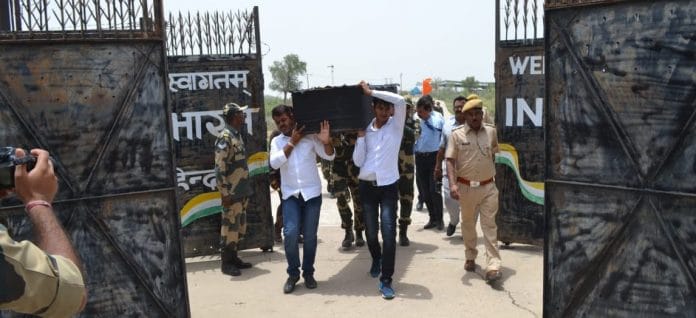A train is the sole link people in Rajasthan have with family members across the border. Their predicament came to light when one of them died in Pakistan.
New Delhi: India and Pakistan’s shared moment of grief last week, when a border gate in Rajasthan was opened after 12 years to let an elderly woman return home for her last rites, brought to fore the ancient ties that still hold together communities split by a bitter Partition seven decades ago.
The ties are especially strong in the villages that dot the tense border – according to a former MP, at least one lakh families in Barmer’s villages alone have relatives in Pakistan.
Reshma, a resident of the Agasadi village in Rajasthan’s Barmer, went across the border to meet her relatives but died three days before she was to return on 28 July.
As complicated paperwork delayed her body’s return aboard the weekly Thar Express, which passes through the Munabao-Khokrapar border, her worried relatives sought the opening of the gate that stands on the road route parallel to the train’s.
The last time this gate was used was in 2006, when former foreign minister Jaswant Singh led an 86-member delegation to visit the Hinglaj temple, a temple sacred to both Hindus and Muslims, in Balochistan. That was also the year the Jodhpur-Karachi Thar Express was launched, and the road route shut down.
Also read: New Delhi worries as China digs out gold in Tibet next to Indian border in Arunachal
The only link
Unlike the Attari-Wagah border, open for foot traffic, trade as well as the Samjhauta Express, the Munabao-Khokrapar link opens only for Thar Express.
The Munabao-Khokrapar line is the only link between this part of Rajasthan and Pakistan, and locals have long called for the border to be opened for road and trade passage too.
Speaking to ThePrint, former Barmer MP Harish Chaudhary said at least one lakh families in the border villages had relatives in Pakistan.
When she couldn’t be brought on-board the train, Reshma’s desperate family approached Barmer MLA Manvendra Singh.
Singh, reached out to the Indian immigration authorities, the Indian High Commission in Islamabad, and the Border Security Force (BSF). The MLA told ThePrint that it took him three days to bring the authorities in agreement to open the gate.
“In a situation like this, why wait for a train route when there is road route available?” he added.
Made aware of the issue on Twitter, external affairs minister Sushma Swaraj stepped in too, and asked Indian high commissioner Ajay Bisaria to help the family.
Ajay Bisaria – Please help @IndiainPakistan https://t.co/tXGNxo2sYi
— Sushma Swaraj (@SushmaSwaraj) July 26, 2018
The cross-border effort culminated in the opening of the gate on 31 July, and an ambulance carrying Reshma’s body brought her home.
BSF personnel, immigration officers, police and representatives of the district administration were gathered at the border as the body was handed over by the Pakistan Rangers.
Traditions, relationships, tensions
Thanks to a Rajput tradition, cross-border marriages are a widely prevalent tradition in villages around this border.
Men and women of the various castes that comprise the Rajput community do not marry within the same castes. Since there aren’t many Rajputs in Pakistan, families often wed their daughters to grooms across the border.
The hostility between the two nations and the consequent difficulty in grant of visas, locals said, is putting off potential grooms and spawning several ill practices.
“Due to the tiresome visa and citizenship process for Pakistani brides, a lot of dowry is given to convince the groom’s family in India, and to get the dowry across the border, a lot of bribery is involved too,” said social activist Rani Sarita Kumari.
A native of Umerkot, Pakistan, Kumari came to India in 1984 after marrying into a local Rathore family. Since then, she has used her own experience to help many economically weaker women with the process.
Kumari said one of the key difficulties faced by Indians living in Pakistan is the Indian High Commission’s reluctance to grant visas to their families.
“On top of that, the sponsorship procedure takes at least a month to process,” she added. Kumari was referring to the sponsorship certificate an Indian has to get attested if his/her Pakistani relatives are visiting, taking responsibility for his/her good conduct and timely return.
Also read: A traditional justice system can help resolve India-Pakistan conflict
Another migrant who is now an Indian citizen, Daulat Singh Sodha, echoed Kumari – while there were many problems in cross-border travel, getting a long-term visa (LTV) “remains the single-most tiring process”.
While the visa process is unlikely to ease soon, residents have sought smaller reliefs like the opening up of the border road gate. Another demand is to allow boarding of the Thar Express at Munabao, where the train halts only for customs formalities. Locals who wish to travel across the border have to first go 200 kilometres in the opposite direction to Jodhpur. It’s a demand former MP Chaudhary said he had raised as well, adding that there had been no movement on that front.
The Thar Express is one of the cheapest means of transportation between the two countries. Earlier this year, the rail link was extended for another three years, till January 2021.







All the best off luck ThePrint